Have questions about new car registrations and what kind of sales story they can help you tell? The IHS Polk New Registrations dataset has answers.
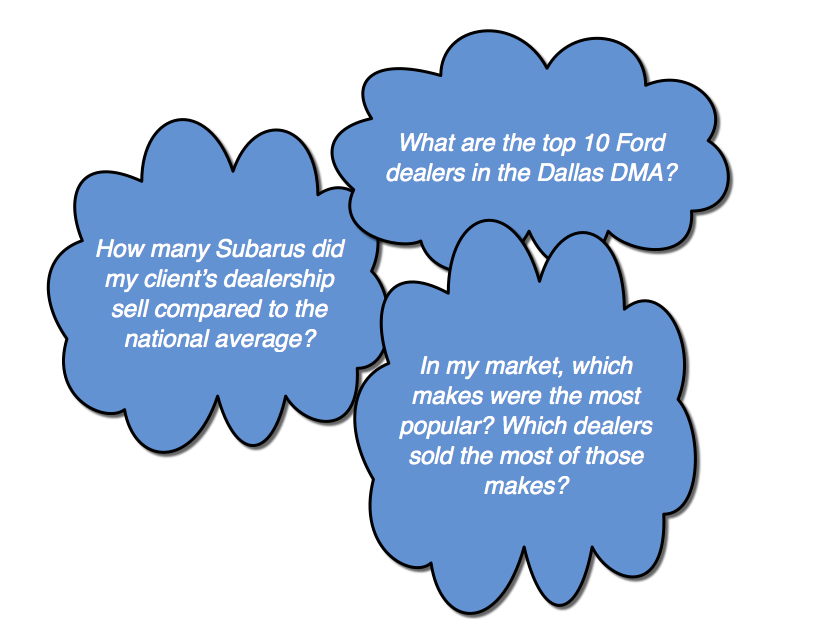
Overview
The IHS Polk dataset offers a comprehensive picture of car sales in the United States by combining the following kinds of information:
- Registration data for new cars, including the make, model, and selling dealer
- Hyper-localized geographic information about registrations and dealers
- Demographic information about buyers, such as age, gender, income, and ethnicity
Use this information to create detail-rich presentations that can show dealer market share, buying trends (perhaps by geography, or maybe by a target demographic), breakdowns of registrations by various factors (by dealer, by make or model, by a geographic element, by a demographic element), and more.
Frequency of Updates
IHS Polk releases data each month, though that data is two months behind the current month. For example. June registration data is released in the middle of August; this delay allows IHS Polk to thoroughly collect all registration data for the month of June.
Rhiza also updates our Polk data monthly, typically within a few days of receiving the updates from IHS Polk.
Geographic Coverage
The Polk datasets offer varied levels of coverage for all 50 states and the District of Columbia. For more detailed information on the information each state provides, see Collection Methodology.
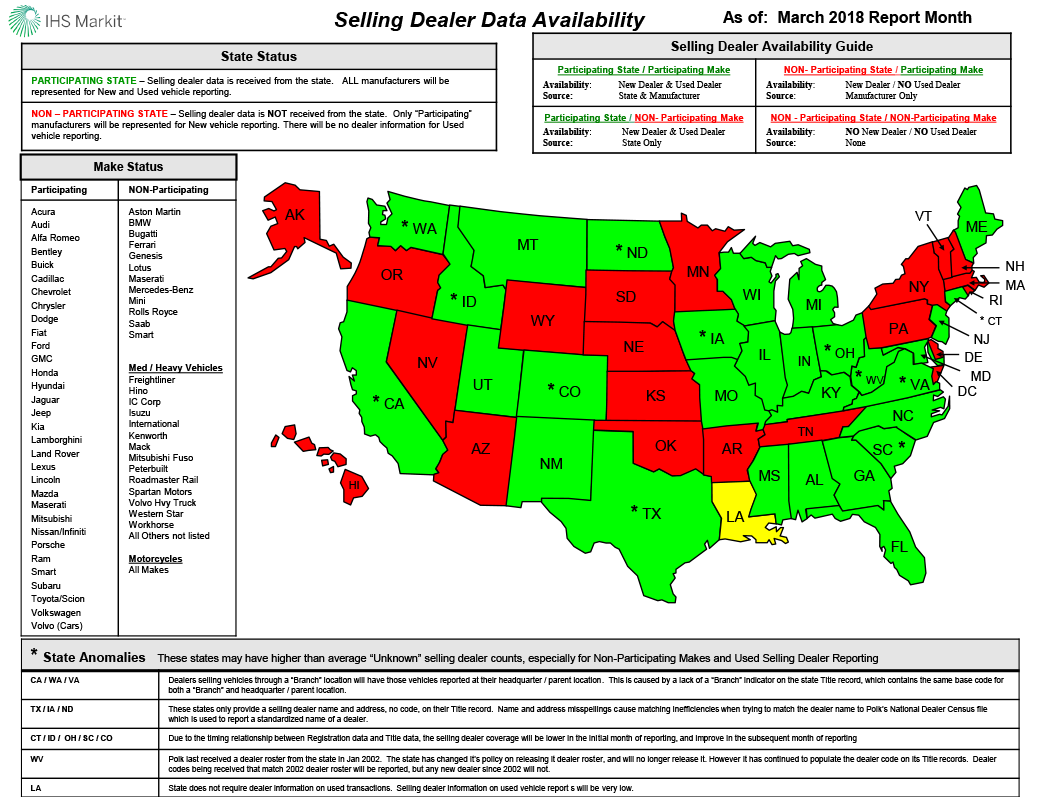
Dataset Attributes
The available attributes can vary depending on your company's IHS Polk subscription, and can also vary depending on whether you are using the New Registrations or Used Registrations dataset.
Polk Base Attributes
Dealer Count (number) : The number of dealers
New Registrations (number) : The number of new car registrations
Dealer-Related Filters
Dealer : A concatenation of the Dealer Name and Dealer Address attributes (useful to find dealers with similar names)
Dealer Address : A dealer's street address
Dealer City : A dealer's city
Dealer DMA Code : A dealer's DMA code
Dealer DMA Name : The name of the DMA where the dealer is physically located. Use this attribute when you want to see all of the registrations attributed to a dealer in the specified DMA, or to all dealers in a DMA, regardless of where the car actually is. (This is useful as part of a "pump in, pump out" scenario.)
Dealer Name : A dealer's name
Dealer State : The name of the state where the dealer is physically located. Use this attribute when you want to see all of the registrations attributed to a dealer in the specified state, or to all dealers in a state, regardless of where the car actually is. (This is useful as part of a "pump in, pump out" scenario.)
Dealer ZIP Code : The ZIP Code where the dealer is physically located. Use this attribute when you want to see all of the registrations attributed to a dealer in the specified ZIP Code, or to all dealers in a ZIP Code, regardless of where the car actually is. (This is useful as part of a "pump in, pump out" scenario.)
Latitude & Longitude : The map coordinates of a dealer
Purchase-Related Filters
Date : The date of the registration. This is a required attribute that is set to Rolling Year to Date (RYTD) by default. You can also use the Current Year to Date (CYTD) or build a custom date range.
Make : The make of the registered car
Model : The model of the registered car
Model Year : The model year of the registered car
Segment : The segment the registered car belongs to
Demographic-Related Filters
Age : The age of the car buyer
Ethnicity : The ethnicity of the car buyer
Gender : The sex of the car buyer
Income : The income level of the car buyer
Polk Demographic Methodology
Demographic information can be a great way to glean more insight into car purchase trends. Be aware, though, that -- as is the case for all demographics -- the age, income, gender, and ethnicity attributes are often the result of best-faith estimates, self-reporting, or both. IHS Polk uses a third-party provider to extract demographic information for each registration.
The methodology for assigning demographic information to a registration is as follows:
- Age and income are modeled "head of household" data that are based on the name and address given on the title and registration.
- Ethnicity is derived from the first name, last name, and ZIP Code on the title and registration.
- Gender is assigned based on the honorific (Mr., Mrs., Dr., etc.) used on the title and registration:
- When the title includes both Mr. and Mrs. (for example, Mr. and Mrs. Chris Smith), the first honorific is used. This is especially important in cases where the name can be either male or female. In this example, the registration's gender attribute has a value of male.
- When the honorific is Dr. and the name can be either male or female (again, Dr. Chris Smith), the registration gender has a value of unknown.
Collection Methodology
The Polk New Registrations dataset is fact-based, meaning it contains records for U.S. vehicle registrations. Information is gathered from the following sources:
- Individual states
- Vehicle manufacturers
- Finance companies
- Third-party sources
All new registrations are recorded for all vehicles in all states, down to the ZIP Code level. However, not all states and not all car manufacturers report the same level of information.
State Status
Participating State
Selling dealer data is received from the state. ALL manufacturers will be represented for New and Used vehicle reporting.
Non-Participating State
Selling dealer data is NOT received from the state. Only “Participating” manufacturers will be represented for New vehicle reporting. There will be no dealer information for Used vehicle reporting.
Selling Dealer Availability Guide
Participating State & Participating Make
Availability: New Dealer & Used Dealer
Source: State & Manufacturer
Non-Participating State & Participating Make
Availability: New Dealer / NO Used Dealer
Source: Manufacturer Only
Participating State & Non-Participating Make
Availability: New Dealer & Used Dealer
Source: State Only
Non-Participating State & Non-Participating Make
Availability: NO New Dealer / NO Used Dealer
Source: None
Use the following map to see which states and makes are participating.
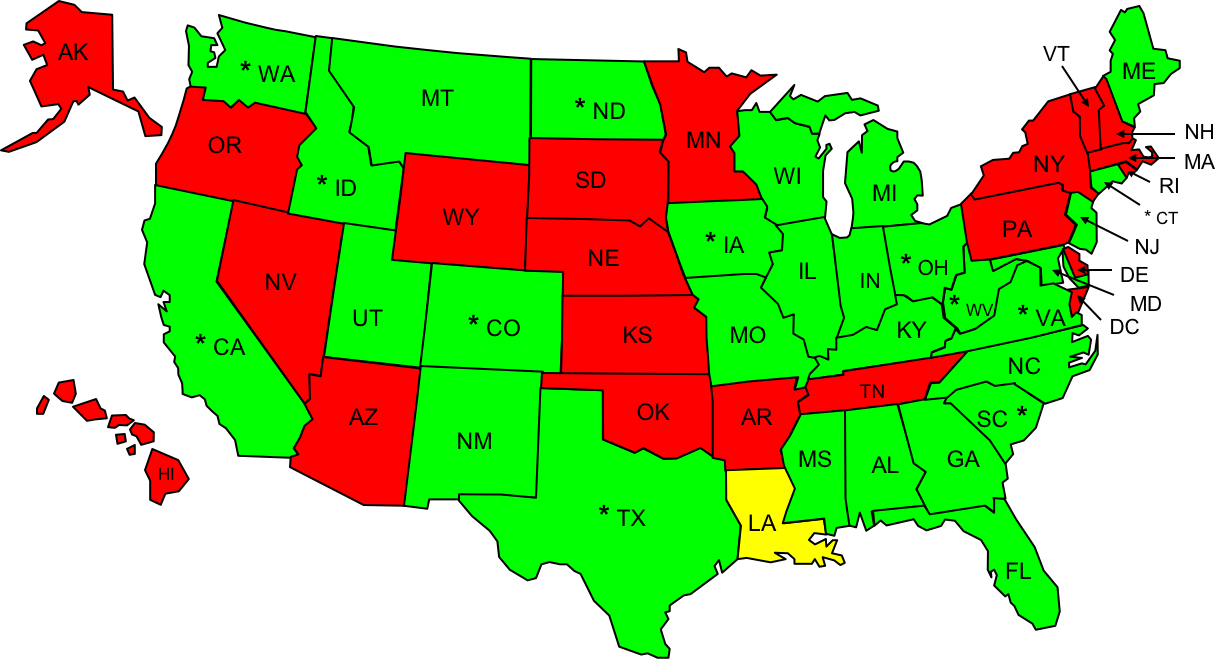
Participating Makes
Acura, Audi, Alfa Romeo, Bentley, Buick, Cadillac, Chevrolet, Chrysler, Dodge, Fiat, Ford, GMC, Honda, Hyundai, Jaguar, Jeep, Kia, Lamborghini, Land Rover, Lexus, Lincoln, Mazda, Maserati, Mitsubishi, Nissan/Infiniti, Porsche, Ram, Smart, Subaru, Toyota/Scion, Volkswagen, Volvo (Cars)
Non-participating Makes
Aston Martin, BMW, Bugatti, Ferrari, Genesis, Lotus, Maserati, Mercedes-Benz, Mini, Rolls Royce, Saab, Smart
Non-participating Hed / Heavy Vehicles
Freightliner, Hino, IC Corp, Isuzu, International, Kenworth, Mack, Mitsubishi Fuso, Peterbuilt, Roadmaster Rail, Spartan Motors, Volvo Heavy Truck, Western Star, Workhorse, All Others not listed.
Non-participating Motorcylces
All makes
State Anomalies
There are a few anomalies on the list. These states may have higher than average “Unknown” selling dealer counts, especially for Non-Participating Makes and Used Selling Dealer Reporting
California, Washington and Virginia: Dealers selling vehicles through a “Branch” location will have those vehicles reported at their headquarter / parent location. This is caused by a lack of a “Branch” indicator on the state Title record, which contains the same base code for both a “Branch” and headquarter / parent location.
Texas, Iowa, and North Dakota: These states only provide a selling dealer name and address, no code, on their Title record. Name and address misspellings cause matching inefficiencies when trying to match the dealer name to Polk’s National Dealer Census file which is used to report a standardized name of a dealer.
Connecticut, Idaho, Ohio, South Carolina, and Colorado: Due to the timing relationship between Registration data and Title data, the selling dealer coverage will be lower in the initial month of reporting, and improve in the subsequent month of reporting
West Virgina: Polk last received a dealer roster from the state in Jan 2002. The state has changed it’s policy on releasing it dealer roster, and will no longer release it. However it has continued to populate the dealer code on its Title records. Dealer codes being received that match 2002 dealer roster will be reported, but any new dealer since 2002 will not.
Louisiana: State does not require dealer information on used transactions. Selling dealer information on used vehicle report s will be very low.
Frequently Asked Questions
If you're using the IHS Polk New Registrations dataset, check here for answers to common questions.
Why doesn't the data contain the information I expect to see?
Car registration data comes from individual states, car manufacturers, finance companies, and other third-party sources. However, not all states and not all car manufacturers report the same level of information. All new registrations are recorded for all vehicles in all states, down to the ZIP Code level. However, some manufacturers and some states don't report dealer-level information. For example, while it's possible to know the number of BMWs sold in a particular New York ZIP Code, it's not possible to know which dealers sold them. In situations like these, the registrations are attributed to Unknown when you group them by dealer.
When I use the Dealer DMA Name attribute while trying to find the ZIP Codes where new cars are sold, I get ZIP Codes outside of the dealer's DMA. Why does this happen?
When people purchase cars, they don't always register them at the purchasing dealer. They may register them at a dealer closer to home. Therefore, Dealer DMA Name isn't always a true indication of where a car was sold; it reflects only where the car was actually registered.
What's the difference between "pump-in" and "pump-out" registrations? Which does Rhiza support?
Pump-in refers to registrations which occurred in the DMA regardless of where the cars were sold. Pump-out refers to cars that were sold in the DMA, but then registered outside of the DMA. There are some markets where pump-out is a more notable figure - typically where a dealership is near the edge of a DMA or has a transient population.
For example, if I live in the Washington, D.C. DMA and buy a car from a dealer in the Richmond, VA DMA, I will drive my car home and register it where I live. This is an example of a pump-in registration in Washington, D.C., and a pump-out registration in Richmond.
Rhiza supports pump-in registrations for a market.
If I want to see registrations on a map, should I use the dataset-based attributes like Dealer DMA Name or Dealer ZIP Code, or should I use the map-based attributes like DMA or ZIP Code?
To see the most accurate picture of registration data, use both; each one shows you a different aspect.
- A dataset-based attribute like Dealer DMA Name returns all registrations that are attributed to a dealer that is physically located within that DMA, even if the cars are not located there. That means that on a map, you will see registrations that are outside of the specified DMA.
- A map-based attribute like DMA returns only those registrations within the DMA itself; it is bound by the geography. Therefore, on a map, you will see only registrations within the specified DMA.
This applies to Dealer State vs. State, as well as Dealer ZIP Code vs. ZIP Code.
To help illustrate the point, let's look at an example. We have two target series configured: The first one looks at Buick registrations that are attributed to any dealer that is located in the Pittsburgh DMA, using the Dealer DMA Name attribute. The second series looks at Buick registrations that geographically confined to the Pittsburgh DMA, using the map-based DMA attribute.
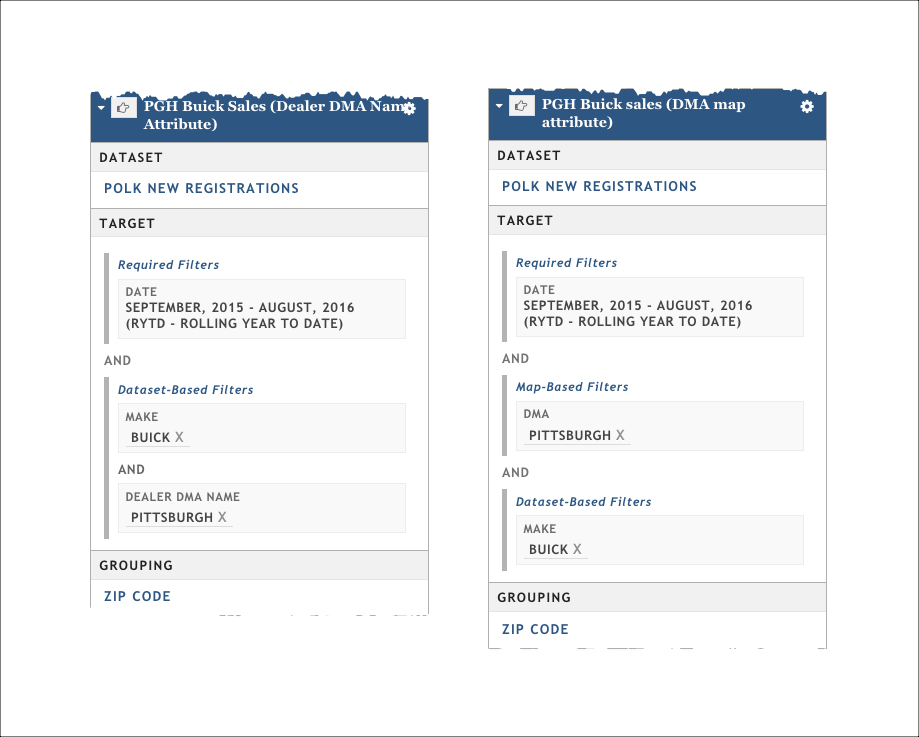
When we map each target series, it's easy to see how differently the dataset-based DMA Dealer Name attribute and the map-based DMA attribute affect the registration data that's returned. Because the map-based DMA attribute excludes any registrations for cars that fall outside of the specified DMA, it doesn't account for cars purchased by anyone outside of the DMA (individuals or other dealers).
On the other hand, using the DMA Dealer Name attribute does show all of the cars purchased from dealers within the DMA, regardless of where the actual registration occurred (commonly called "pump out").
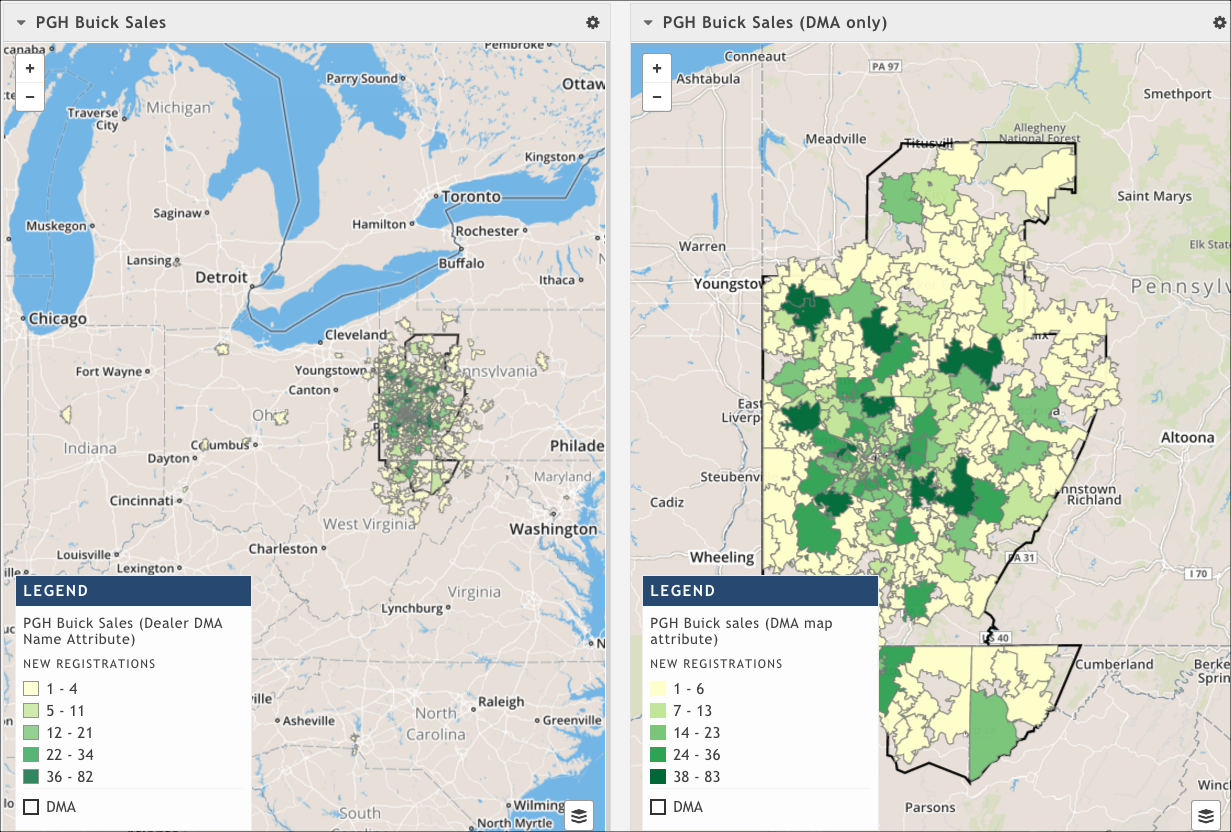
Where can I find information about Polk segments?
You can download a spreadsheet with information on Polk segments. This information was made available by IHS Polk and is current as of this writing.
If you don't see your question answered in this topic, check with Rhiza support or with your IHS Polk representative.